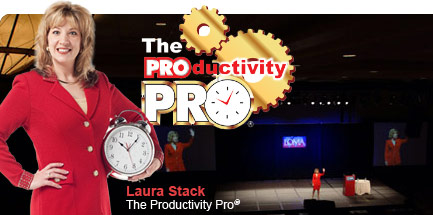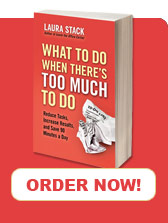Personal Productivity as a Habit
By this point in your career, you've most likely figured out the basic requirements for achieving workplace productivity. No doubt you have a good idea of how to manage your time, set goals, break big tasks into smaller ones, prioritize your task list, keep your email inbox empty, shake off procrastination, and dodge perfectionism. In other words, you've learned the principles of high performance.
But knowing what to do doesn't matter if you don't do it: day in and day out, in all circumstances, even when you don't feel like it. Fortunately, human nature serves you well here. Once used to a task, you can generally shift into a semi-automatic mode that allows you to perform the task efficiently, without having to constantly remind yourself about what comes next. Having a routine saves you time, effort, confusion, and (at some level) conscious thought.
For example, think back to when you learned to drive (my first car was a Ford Pinto, yikes!). When you first got behind the wheel, you probably felt anxious and hyper-aware of your environment at all times. You had to think about every little thing you did--turn on your blinker, look in the mirror, park without hitting anything. You essentially followed a "recipe" in order to accomplish your task. But after a while, it became routine. Now you automatically slip your seatbelt on, quickly glance in the mirrors, and make your adjustments before you turn the key--all more or less without thinking. Even after you get on the road, you remain fairly relaxed. You keep an eye on your environment almost subconsciously--while you're actively thinking about other things--and sometimes doing other things (you know who you are).
This process easily translates to the workplace. Now, I'm not telling you to just turn off your brain while at the office, and I certainly don't mean you should ever stop looking for more efficient ways to do your work. But at the risk of wearing yourself into a rut, habits can help you achieve a consistent level of productivity. Mind you, this falls into the "easier said than done" category, because the overall productivity habit consists of a lot of smaller, self-reinforcing habits that come together to maximize efficiency.
Formulating a Plan
When you get right down to it, most of your actions stem from established habits. Indeed, according to some philosophers, one's behavior represents little more than the sum total of one's personal customs and traditions. I find this attitude simplistic, but I do agree that the engine of routine, properly harnessed, can be very powerful.
The problem is that individual habits can often work against each other. To use an analogy, if you hitch up a wagon with four strong horses pulling in four different directions, you probably won't make much progress toward anything. Ah, but when you get the horses yoked together properly and going in the same direction, off you go at a good pace.
If things seem to go every which way in your work life, or grind along with little direction, then you may be dealing with old ingrained habits working against one another. You can't easily fix this on the fly; any life-changing activity requires careful thought and planning. So arrange some time when you can brainstorm, and sit down with pen, paper, and your most important productivity resources: your brain, experience, and imagination.
Examine your routine, and ask yourself what each of your existing habits does for you. If necessary, document every piece of your typical day from the time you arrive at the office to the minute you leave work. You may discover that some of your habits actually work against productivity. For example, if you regularly arrive late or take a smoke break on the hour every hour, then you can safely say you're shooting yourself in the foot from a productivity standpoint.
Even necessary workplace tasks can hinder productivity if you approach them the wrong way. Email serves as a classic example; keeping your email open all day and checking it repeatedly diverts your attention and destroys focus. Unless your job requires otherwise, a better habit would be to handle your email just a few times a day. In this case, you'll need to erase the old habit and replace it with the new one.
Again, easier said than done. But habit is all about making gradual changes to your behavior, until you break out of the old grooves and develop new ones. As Mark Twain once pointed out, "Habit is habit, and not to be flung out of the window by any man, but coaxed downstairs a step at a time."
Read the rest of the article here.
If you'd like further details on how to construct and maintain an effective workflow process that allows you to get everything done and still have a life outside of work, be sure to grab a copy of my new book, What To Do When There's Too Much To Do, when it hits bookstores in 2012.
Make it a productive day! (TM)
© Copyright 2012 Laura Stack. All rights reserved. www.TheProductivityPro.com | 


